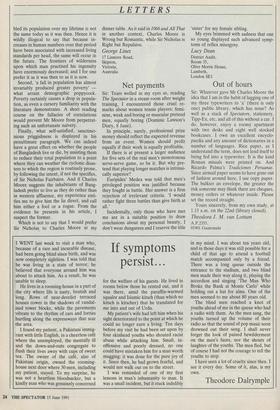If symptoms
persist...
I WENT last week to visit a man who, because of a rare and incurable disease, had been going blind since birth, and was now completely sightless. I was told that he was living in a state of terror; he believed that everyone around him was about to attack him. As a result, he was unable to sleep.
He lives in a rooming-house in a part of the city where life is nasty, brutish and long. Rows of near-derelict terraced houses cower in the shadows of vandal- lised tower blocks, while the pavements ,vibrate to the rhythm of cars and lorries hurtling along the expressways that scar the area.
I found my patient, a Pakistani immig- rant with little English, in a cheerless café where the unemployed, the mentally ill and the down-and-outs congregate to flush their lives away with cups of sweet tea. The owner of the café, also of Pakistani origin, owned the rooming- house next door where 30 men, including my patient, stayed. To my surprise, he was not a heartless bloodsucker, but a kindly man who was genuinely concerned for the welfare of his guests. He lived in rooms below those he rented out, and it was there, amid the paraffin-warmed squalor and Islamic kitsch (than which no kitsch is kitscher) that he translated for me into and out of Urdu.
My patient's wife had left him when his sight deteriorated to the point at which he could no longer earn a living. Ten days before my visit he had been set upon by four skinhead youths who shouted racist abuse while attacking him. Small, in- offensive and poorly dressed, no one could have mistaken him for a man worth mugging: it was done for the pure joy of it. Since then, he had grown fearful, and would not walk out on to the street.
I was reminded of one of my first lessons in man's inhumanity to man. It was a small incident, but it stuck indelibly in my mind. I was about ten years old, and in those days it was still possible for a child of that age to attend a football match accompanied only by a friend. There was a long queue outside the entrance to the stadium, and two blind men made their way along it, playing the accordion and singing 'The Man Who Broke the Bank at Monte Carlo' while holding out a hat for alms. One of the men seemed to me about 80 years old.
The blind men reached a knot of youths ahead of me in the queue who had a radio with them. As the men sang, the youths turned up the volume of their radio so that the sound of pop music soon drowned out their song. I shall never forget the look of pained bewilderment on the men's faces, nor the shouts of laughter of the youths. The men fled, but of course I had not the courage to tell the youths to stop.
I have seen a lot of cruelty since then. I see it every day. Some of it, alas, is my own.
Theodore Dalrymple


















































 Previous page
Previous page